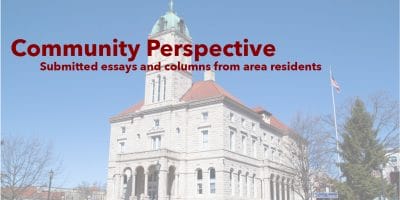
By Kyle Kirby, contributor
On the eve of Martin Luther King Jr. Day, politicians, filmmakers, churchgoers, students, and local citizens gathered at the Lucy F. Simms Continuing Education Center in the name of racial justice and healing.
Sunday’s “Reality of Hope” event, organized by the Northeast Neighborhood Association, Eastern Mennonite University (EMU), and Bethel African Methodist Episcopal church, showcased the history of, and hope for, African American communities in the forms of worship, stories, and art.
“We come today to praise the Lord in positivity,” Bethel’s Rev. Dr. Chinita Richardson said. “We don’t want to be caught up in the negative rhetoric outside these walls.”
Other presenters, including state Sen. Jennifer McClellan and activist documentarian Brian Favors, shared similar messages of hope throughout the context of history.
Harrisonburg Mayor Deanna Reed said that Dr. King always spoke about how one must have courage and hope pursuing a dream. She shared how, though the lives of African Americans have greatly improved since their ancestors were first brought to the United States, there is still more work to be done.
“It is my hope that we continue to work together as a community to love and respect one another as neighbors, and to hope and stand for what we believe is right at our core, as a city,” Reed said.
Afterwards, the chair of EMU’s music department, David Berry, played a piano rendition of the old spiritual “Go Down, Moses.” The audience then sang “Lift Every Voice and Sing,” by James Weldon Johnson – a song sometimes referred to as the Black National Anthem.
Brian Favors, co-founder and program director of the Nate Parker Foundation, shared part of a docuseries created by students from historically black colleges and universities.
The Nate Parker Foundation, based in New York, offers aspiring black filmmakers professional training in leadership and cinematography. Through the foundation, Favors’ team of young filmmakers created “400 Years Later…’free-ish,” a four-part documentary about the arrival of the first enslaved Africans in Virginia.
“One of our goals was to have young people spearheading it. With serious issues we have adults interested in politics, but the youth often have no perspective,” Favors said. The docuseries “encourages education on something that was underpromoted, and raises awareness of its significance.”
A monument to freedom

State Sen. Jennifer McClellan took the podium to acknowledge strides being made to recognize African American culture and history in Richmond, such as the Emancipation Proclamation and Freedom Monument. The monument will be placed on Brown’s Island, which sits between the Haxall Canal and the James River in the state capital, some time this summer.
The bronze monument will serve as a testament to African Americans’ struggle to gain freedom throughout American history. It depicts two freed slaves, one figure literally breaking out of chains, while the other holds the Emancipation Proclamation. The base features the names of ten notable African American Virginians – including Harrisonburg’s own Lucy Simms.
2020 marks about 150 years since the first African American men served in the Virginia General Assembly, McClellan said. It is also the 100th anniversary of women gaining the right to vote in America, and the 55th anniversary of the Voting Rights Act, which guaranteed voting rights to racial minorities.
Reflecting on these historical milestones, McClellan quoted part of Dr. King’s famous “I have a dream” speech, which he gave during the March on Washington in 1963.
“Out of a mountain of despair, a stone of hope,” she recited.
McClellan shared a bit of her own background, beginning with her great-grandfather who started a public school in Alabama, and a great-grandmother who never had the right to vote.
“We’re all fighting for something bigger than ourselves, fighting for that stone of hope. Everybody gets tired, scared, angry, but if we give up, that stone of hope gets crushed,” McClellan said.
McClellan’s speech concluded with a standing ovation in a room crackling with emotion.
McClellan told The Citizen that she believes the event itself, and the new monument, contribute to the fight for justice and equality through healing.
“Like any family or individual trauma, if you don’t acknowledge what happened and talk about the impacts you never fully heal,” McClellan said. “By telling the truth about our history, we can begin to heal from it.”












